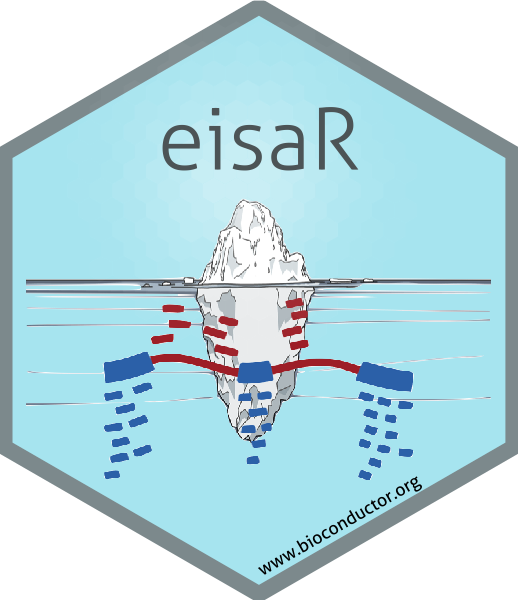Exon-intron split analysis (EISA) uses ordinary RNA-seq data to measure
changes in mature RNA and pre-mRNA reads across different experimental
conditions to quantify transcriptional and post-transcriptional regulation
of gene expression.
For details see Gaidatzis et al., Nat Biotechnol 2015. doi: 10.1038/nbt.3269.
eisaR implements the major steps of EISA in R.
In addition, it contains functionality for extracting spliced and unspliced
transcript sequences, as well as intron sequences (with similar options as
the BUSpaRse) package), from an
annotated genome. These sequences can be indexed and used, e.g., for
quantification in preparation for RNA velocity estimation.
Developed by:
- Michael Stadler
- Dimos Gaidatzis
- Lukas Burger
- Charlotte Soneson
Also a big "thank you" for contributions to:
To install eisaR from Bioconductor, you will need at least R 4.0 and Bioconductor 3.11, which is available on April 28, 2020. Then use the following within R (see also eisaR download page):
# BiocManager is needed to install Bioconductor packages
if (!requireNamespace("BiocManager", quietly = TRUE))
install.packages("BiocManager")
# Install eisaR
BiocManager::install("eisaR")
All you need is RNA-seq data from at least two conditions (e.g. wildtype and
mutant). The eisaR package contains convenience functions to facilitate the
steps in an exon-intron split analysis, which consists of:
- preparing the annotation (exonic and gene body coordinate ranges)
- quantifying RNA-seq alignments in exons and introns
- calculating and comparing exonic and intronic changes across conditions
- visualizing the results
For the steps 1. and 2. above, this eisaR vignette makes use of Bioconductor
annotation and the QuasR package.
It is also possible to obtain count tables for exons and introns using some
other pipeline or approach, and directly start with step 3.
EISA has been described in:
"Analysis of intronic and exonic reads in RNA-seq data characterizes
transcriptional and post-transcriptional regulation."
Gaidatzis D., Burger L., Florescu M. and Stadler, M.B.
Nat Biotechnol. 2015; 33(7):722-9.
PubMed: 26098447, doi: 10.1038/nbt.3269
The functionality for extracting spliced and unspliced transcript sequences, as well as intron sequences, for use in RNA velocity analysis, has been described in:
"Preprocessing choices affect RNA velocity results for droplet scRNA-seq data." Soneson C., Srivastava A., Patro R. and Stadler, M.B. PLoS Comput Biol 2021; 17(1):e1008585. PubMed: 33428615, doi: 10.1371/journal.pcbi.1008585
| Platforms | OS | R CMD check | Coverage |
|---|---|---|---|
| GitHub Actions | Linux/Windows/macOS | ||
| Bioc (devel) | Multiple | ||
| Bioc (release) | Multiple |
